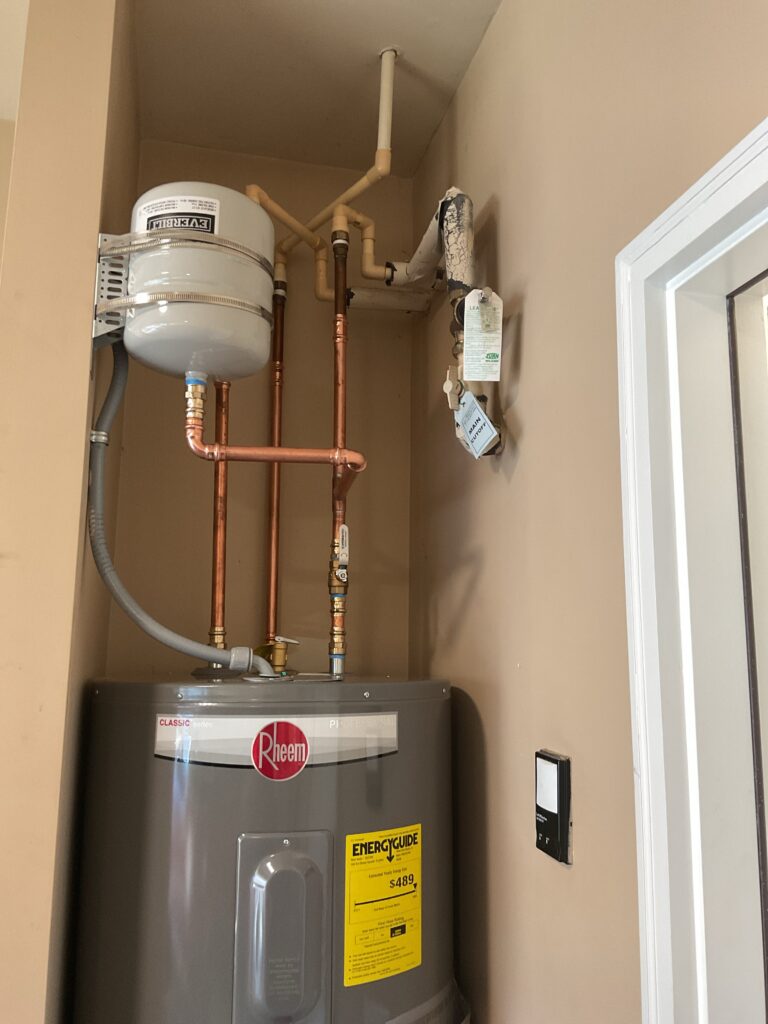Have you ever really thought about your water heater? Probably not, unless you’re standing in a shower that’s suddenly gone ice-cold. When things go wrong at home, a faulty water heater is often one of the prime suspects for your discomfort. The stress of a leak, weird noises, or no hot water can really take a toll.
One of the best ways to prevent that stress is to know when it might be coming. That means getting familiar with how long your water heater is meant to last and when to start window-shopping for a new one.
How Long Does a Classic Storage Tank Water Heater Last?
This is the system you probably have in your basement or a closet. It’s a large, insulated tank that maintains a constant supply of hot water, ready for you 24/7. Because it’s constantly working to heat and store water, the parts inside experience steady wear.
Over time, the minerals in your hard water can cause the tank to corrode. This 8 to 12-year window is a solid average. If yours is creeping up on a decade old, it’s a good idea to start paying closer attention to its performance.
Newer Tankless Water Heaters Are Built to Last Much Longer
Tankless water heaters are a different breed. Instead of storing hot water, they use powerful heating elements to heat water instantly as you need it. Since they aren’t holding gallons of corrosive water all day long, they avoid a lot of the wear and tear that storage tanks face. Their longer lifespan is a big reason people make the switch. They only fire up when you turn on a hot water tap, which means less work over the years. This extended life, often double that of a tank model, makes them a great long-term investment for many homeowners.
Several Other Key Things Can Either Shorten Its Life or Help It Go the Distance for Years to Come
Your water heater’s final age is not set in stone. The environment it lives in and how it’s treated play a huge part in the story. Think of it like a car, where two identical models can have very different fates depending on the driver and road conditions.
Water Quality
Hard water is tough on your system. The minerals build up inside, forming a layer of sediment that makes the heater work harder and wear out faster.
How Much You Use It
A big family that runs the dishwasher, washing machine, and showers daily will put more strain on a water heater than a single person. More use means more wear.
The Installation Quality
A professional installation sets your heater up for success. A poor job can lead to performance issues and a shorter life right from the start.
Maintenance Habits
Just like your car, your water heater needs some attention. Ignoring it is the quickest way to an early replacement.
Simple Ways You Can Help Your Water Heater Last Longer
There are a few practical things you can do to add years to its life and keep it running smoothly.
For traditional tank heaters, flushing the tank once a year is a game-changer. This process drains the tank and removes all the mineral sediment that builds up at the bottom. That gunk forces your heating elements to work overtime and can cause the tank to corrode from the inside out. It’s a simple task that prevents major damage and improves efficiency.
Inside your tank is something called an anode rod. Its job is to attract corrosive elements in the water so they eat the rod instead of your tank. This rod needs to be checked every few years and replaced when it’s worn down. Having a pro come out for a regular check-up helps catch these small issues before they become big, expensive problems that leave you without hot water.
Your Water Heater Will Usually Give You Some Hints That It’s About to Go
Your system will drop clues that its final days are approaching. If you spot any of these signs, it’s time to start thinking about a new unit before your current one fails completely. Look for rusty or discolored water coming only from your hot taps, which suggests the inside of the tank is rusting away. Listen for rumbling or popping sounds, which are often caused by boiling water getting trapped under layers of sediment. And, of course, if you see any water pooling around the base of the heater, that’s a clear sign of a leak.
When It’s Time for an Upgrade, You Need a Team That Moves as Fast as Modern Plumbing Technology Does
When your water heater’s time is up, ServiceWise Electric & Plumbing can bring you a new, efficient model and get it installed right. We can also help you add more years to your current system’s life with proper water heater maintenance.
Water heaters are only getting stronger and more advanced. You need a company that keeps up with that progress, and that’s us. Call today!

